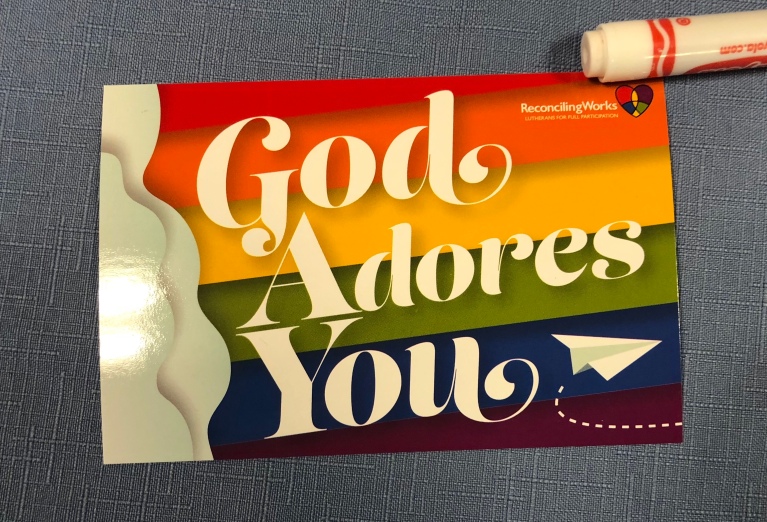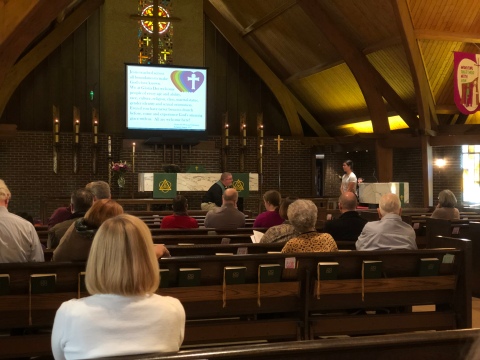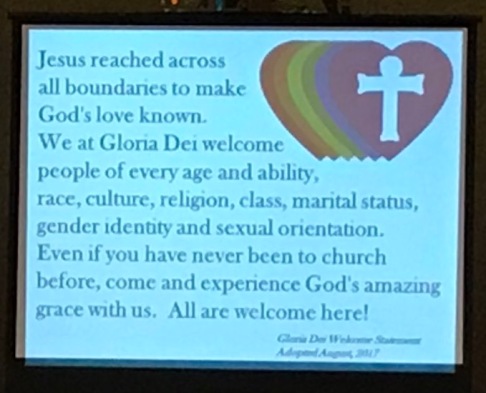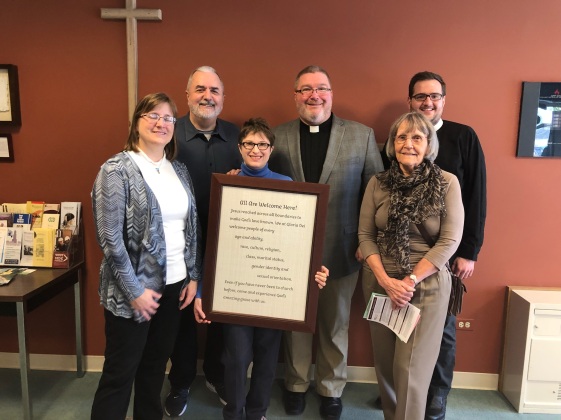The eunuch asks “Is there anything to keep me from being baptized?” No. Not his gender, not his sexuality, not his ethnicity, not his religious affiliation, nothing. There is NOTHING that can keep the eunuch from becoming a full part of the Christian community. There is nothing that can keep us away from God’s unimaginable love.

Reconciling in Christ Sunday
Matthew 19.10-15 (NRSV); Acts 8.26-40
So there I was, sitting in the chapel at St. Francis Retreat Center in San Juan Bautista, California. It was opening worship, and the liturgy continued with a litany, naming significant events and ordinations in the history of Extraordinary Lutheran Ministries — an organization with roots in the Extraordinary Candidacy Project that worked to accompany and support gay and lesbian candidates for ordained ministry in the ELCA when the ELCA told them no.
Just a few hours prior, I was on a plane from Chicago bound for San Francisco, for my first Proclaim Gathering, part of ELM’s continued work to accompany openly LGBTQIA+ candidates for ministry in the Lutheran church — lesbian, gay, bisexual, transgender, queer, intersex, asexual… the acronym ever expanding as we catch up with the many identities our Creator God has gifted us with.
That evening in opening worship, I knew very few people in Proclaim and had no idea what to expect. As the litany began, it named each person who was ordained extraordinarily (outside of official church polity) — and beyond (when church polity caught up after the 2009 Churchwide Assembly). As the names of those present were read, they were invited to stand, take hold of a piece of the ball of red yarn that was being passed around, and declare: This is my body! The litany continued, too, into the future, naming seminarians, like me, who would make up the future of the church. As the yarn was passed to me, I stood: This is my body! Soon, the whole room was connected with a single strand of red yarn. And I knew I belonged. I was a part of something. My call to ministry mattered.
Growing up in a church body that did not recognize the gifts of LGBTQIA+ persons for ministry, I could not have dreamed that such a moment, like that in the chapel at St. Francis Retreat Center, was possible. It’s no secret that the church has had a rough relationship with its LGBTQIA+ members. Of course, we’ve made great strides. I give thanks for the work of ELM and Proclaim, for my home congregation not far from here in Chicago, for my internship congregation in Omaha, and for you! — the people of Gloria Dei in Northbrook — for your bold witness as an RIC congregation, declaring that all are welcome and affirmed as beloved children of God, exactly as we are.

And yet, we know, the mass of Christianity is still not of one mind. The church tends to have a problem with those who are different, those who don’t fit inside neatly prescribed roles and norms and identities, and so the church has come up with ways to marginalize them, citing select verses of Scripture, plucked out of context, to justify exclusion and violence. But the witness of Scripture, and particularly the teachings of Jesus in the gospels, says differently. The church may have lost touch with God’s dream and vision for a way of being church together that is inclusive, affirming, and life-giving, but Jesus offers this dream and vision anew.
Jesus’s ministry and teaching is marked by a radical inclusivity. That’s easy to miss, though, in a passage like the gospel text we just heard read. In the first place, it begins in the middle of a conversation — a conversation about divorce. That doesn’t exactly preach “all are welcome,” does it?
Zoom out a bit further from our text, and you’ll encounter this:
At that time the disciples came to Jesus and asked, “Who is the greatest in the kingdom of heaven?” He called a child, whom he put among them, and said, “Truly I tell you, unless you change and become like children, you will never enter the kingdom of heaven. Whoever becomes humble like this child is the greatest in the kingdom of heaven. Whoever welcomes one such child in my name welcomes me. (Matthew 18.1-5)
Children, in Jesus’s cultural context, were looked down upon, or even ignored, for their young age and inability to be productive members of their family and the wider community. And yet, these children are the greatest in the kingdom of heaven! Jesus’s teaching continues with a stern warning against putting a stumbling block before these little ones. Take care not to despise them, he goes on.
It is this lead-up that brings us, just a handful of verses later, to our gospel text today. Now, a word about divorce in first-century Palestine: At the risk of oversimplifying things, divorce then is not like divorce today. This text, then, is not saying anything to persons affected by divorce or marital separation in our context, despite what the church may say in the judgmental way it is often inclined to do.
What this text is calling out is the ugly underside of divorce in Jesus’s day. It was men alone who generally had the right to initiate a divorce, and it was the women who were left with no legal recourse, adversely affected by an unjust system, and open to ridicule and abuse. It is with this in mind that Jesus speaks out against the practice of divorce.
Another crucial detail: It is the Pharisees, not Jesus, who bring up this whole topic of divorce to begin with, as a way to try to trap Jesus and make him contradict centuries of Jewish tradition. And Jesus’s response boils down to this: Yes, the law of Moses allowed for divorce, but a legal way to deal with a bad situation doesn’t make that bad situation any less awful, especially not for the women who are so adversely affected.
Then, immediately after this debate about divorce, Jesus comes back… to the children. When you read these two chapters of Matthew’s gospel together, Jesus’s emphasis is clear: It is these little ones Jesus is concerned about because it is these little ones to whom the kingdom of heaven belongs. With that in mind, a pattern emerges: Jesus is teaching about the inclusion of the little ones, but he is interrupted by the Pharisees who ask about divorce. Not to be outdone, Jesus seizes this opportunity to continue to reveal his dream and vision for what the kingdom of heaven looks like — where the little ones, whether children, divorced women, or anyone else “such as these” whom society actively tramples on and marginalizes, are welcomed into the embrace of Jesus and blessed for who they are, as they are.
It’s a theme that runs throughout Matthew’s gospel: Blessed are the poor in spirit, for theirs is the kingdom of heaven, the Beatitudes begin. Just as you did it to one of the least of these… you did it to me, the well-known parable summarizes.
There is a common thread that runs through Jesus’s ministry and teaching in Matthew, and it is GOOD NEWS for the poor, GOOD NEWS for the little ones, GOOD NEWS for the least of these, GOOD NEWS for gay and lesbian and bisexual persons, GOOD NEWS for our transgender and intersex and asexual and queer siblings. THEIRS is the kingdom of heaven!
Today, we celebrate that radical inclusivity, God’s dream for a world where all are welcomed and affirmed, and Jesus’s vision for a church that actually lives into that dream.
We celebrate inclusivity today specifically to resist the church’s problem with LGBTQIA+ persons and instead to proclaim God’s extravagant love for persons of all gender identities and sexual orientations.
We celebrate inclusivity that reaches ever further, as you capture in the Welcome Statement you have adopted as a congregation.

God’s dream and vision for the church invites us into encounters like the one between Philip and the Ethiopian eunuch. Tradition often labels this text as the conversion of the eunuch, and that’s not necessarily wrong, but I think Philip experiences his own conversion, too. It’s easy to miss because it’s barely mentioned. It happens just after their conversation in the carriage. “Look, there is some water right there,” the eunuch observes. “Is there anything to keep me from being baptized?” And Philip can’t answer.
Is there anything to keep me from being baptized? No. Not his gender, not his sexuality, not his ethnicity, not his religious affiliation, nothing. There is NOTHING that can keep the eunuch from becoming a full part of the Christian community.
There is nothing that can keep the eunuch away. There is no stumbling block that can keep the little ones away. There is nothing that can keep us away from God’s unimaginable love.

Let the little children come to me.
Let the least of these come to me.
Let the poor in spirit come to me.
Let the LGBTQIA+ community come to me.
Let those whom the world tramples on come to me.
Let the weary and those carrying heavy burdens come to me.
Let all whom I have made and love come to me.
Yours is the kingdom of heaven.
Josh Evans is a Seminarian at the Lutheran School of Theology at Chicago and a candidate for ordination in the Evangelical Lutheran Church in America (ELCA).
